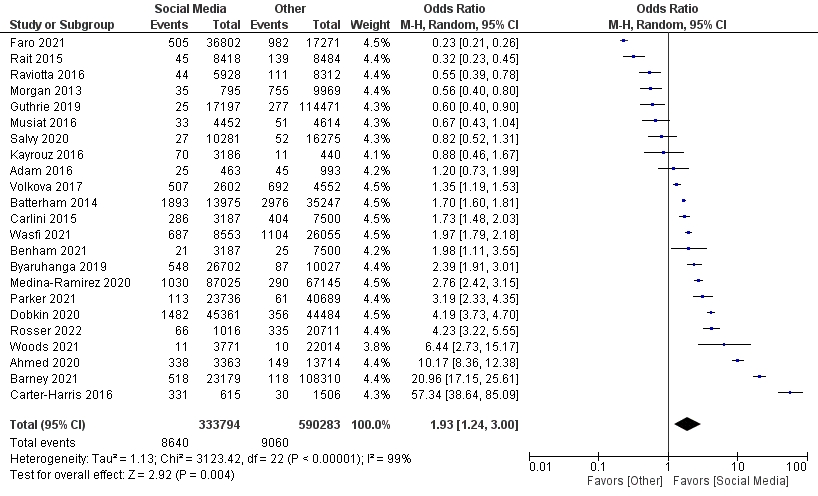Session Information
Date: Sunday, November 12, 2023
Title: (0325–0344) Patient Outcomes, Preferences, & Attitudes Poster I
Session Type: Poster Session A
Session Time: 9:00AM-11:00AM
Background/Purpose: Recruitment of study participants is challenging and can incur significant costs, particularly for studies of rheumatic disease or other rare conditions. Social media advertising is a promising method for recruiting to clinical studies. This approach may improve cost efficiency by targeting specific populations that are more likely to match a study’s criteria. Although individual studies evaluating social media as a recruitment tool have been generally favorable, there are no meta-analyses of its cost-effectiveness.
Methods: Studies evaluating costs of recruitment through social media and non-social media methods were identified on MEDLINE and EMBASE. Articles were screened through a two-step process in accordance with PRISMA guidelines. Cost data was then extracted from included articles, normalized for currency and inflation, and a meta-analysis was performed using the Mantel-Haenszel method. The primary outcome was the relative cost-effectiveness of social media compared to non-social media recruitment, defined as the odds ratio of recruiting a participant per US dollar spent on each method. The secondary outcome was the relative cost-effectiveness of social media recruitment compared only to other online recruitment methods.
Results: After completion of the screening process, 23 studies were included in the meta-analysis. All of the included studies evaluated Facebook as a recruiting tool. Two studies also evaluated Instagram and Twitter, and one study each evaluated Youtube, Reddit, Linkedin, and Snapchat. The sample contained a high degree of heterogeneity, requiring the use of the random effects model. The odds ratio of recruiting a participant through social media advertising compared to non-social media methods per dollar spent was 1.97 [95% CI 1.24-3.00, P = 0.004]. This odds ratio conferred a median advantage over other methods of $45.51 [IQR $13.92-134.81] per enrolled participant for social media compared with $74.89 [IQR $6.57-187.15] per participant for other methods. For the secondary outcome, the odds ratio of recruiting a participant through social media compared to other online methods was 1.66 [95% CI 1.02-2.72, P = 0.04].
Conclusion: Social media advertising is approximately twice as cost-effective as other methods of participant recruitment, although the magnitude of cost-effectiveness is varied between studies and populations. Additional data are needed to determine cost-effectiveness for individual rheumatic diseases and for rare conditions. There are also limited data available for newer social media platforms and for difficult-to-reach populations such as non-English speaking or older individuals. However, the data suggest that incorporating social media into clinical research could improve accrual at a lower cost than traditional methods.
To cite this abstract in AMA style:
Tsaltskan V, Baez R, Firestein G. Meta-Analysis of the Cost-Effectiveness of Social Media Advertising as a Recruitment Tool [abstract]. Arthritis Rheumatol. 2023; 75 (suppl 9). https://acrabstracts.org/abstract/meta-analysis-of-the-cost-effectiveness-of-social-media-advertising-as-a-recruitment-tool/. Accessed .« Back to ACR Convergence 2023
ACR Meeting Abstracts - https://acrabstracts.org/abstract/meta-analysis-of-the-cost-effectiveness-of-social-media-advertising-as-a-recruitment-tool/

